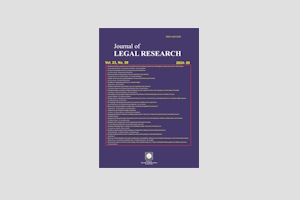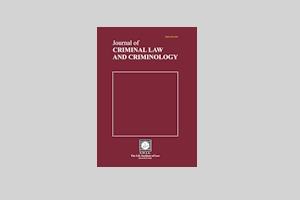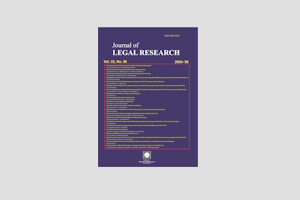Journal of
LEGAL RESEARCH
Number 33
Vol. XVII ● No. 1
Spring 2018
Managing Editor: Vahid Eshtiagh
Editor-in-Chief: Seyyed Ghasem Zamani
CONTENTS
Articles
Comparing between Issuing of Notarize Acts and Secure Electronic Documents in Legal Systems of Some Countries
Dr. Abbas karimi & Amir Sepahi
Intelligent Agent’s Legal Nature in the Field of Electronic Contracts
Dr. Seyyed Elham-aldin Sharifi & Golnaz Beyrami
Compensation from Innocent Arrested Accused
Dr. Rajab Goldoust Jouybari & Mehran Ibrahimi Manesh
Corruption’s Effect on the Realization of Human Rights
Hossein Sepah-sara
The Political Judgment or Judgment Policy? Analyzing the Impact of Non-Legal Factors to Decisions of the International Court of Justice
Yaser Salarian & Mahdi Khalili Torghabe
Case Studies of Probable Contracts in the Legal System of Iran
Dr. Habibollah Rahimi & Khosro MahmoudZadeh
Legal Conformity of Goods with the Contract under United Nations Convention on the International Sale of Goods (CISG)
Dr. Ehsan Lotfi
Illegal Migrant’s Human Rights: Challenges Ahead
Maryam Mahdavi
Assessment of Concept, Place, and Scope of Inclusion of Rate of Services from Aspects of Awards of Full Bench of High Court of Administrative Justice
Dr. Amir Iravanian
Legal Aspects of China’s Dispute and it Neighbors over Spratly Islands
Nasim Zargarinejad
Codification
Author: Dr. Lindsay Farmer
Translators: Dr. Abdolreza Javan Jafari & Sara Mirbazel & Bahman Khodadadee
Articles
Comparing between Issuing of Notarize Acts and Secure Electronic Documents in Legal Systems of Some Countries
Dr. Abbas karimi
Professor at University of Tehran
&
Amir Sepahi
Ph.D. Candidate in Private Law, Islamic Azad University, Central Tehran Branch
Abstract:
Generally there are many differences between the method of issuing notarize acts and secure electronic documents. For the issuing of notarize acts, applicant should be showing up personally in face of notaries, So in this step the notaries can investigate for applicant’s identity, consent, capacity and … .Moreover notaries can confirm the signature is on assignment to applicant. Although there are some legal authorities for issuing of digital certifications but after issuing of encryption keys and digital certifications, there are not any legal authorities for supervising on issuing of secure electronic documents. Therefore the issuing of notarize acts and secure electronic documents are not same. Hence they cannot have same legal effects.
Keywords: Substantive Conditions of Issuing Notarize Act, Configuration Conditions of Issuing Notarize Act, Issuing Digital Signature, Issuing Digital Certification, Issuing Secure Electronic Document.
Intelligent Agent’s Legal Nature in the Field of Electronic Contracts
Dr. Seyyed Elham-aldin Sharifi
Assistant Professor of Law, Faculty of Social Sciences, Imam Khomeini International University
&
Golnaz Beyrami
M.A in Private Law, Faculty of Social Sciences, Imam Khomeini International University
Abstract:
The development of accessing to the cyber space, increasing the speed of transferring data via internet in the electronic commerce area and also the recent scientific advances in the field of artificial intelligence have caused propounding new concepts and appearing unprecedented matters in the legal subjects. Intelligent agent is one of these concepts, as a more advanced group of the kind of electronic agents. The intelligent agent is an invisible software program that concludes contracts automatically and independently in the internet market places with humans or other agents of his own kind on behalf of the human users. Despite legislations about electronic commerce and electronic contracts in recent decades, there is no rule that clarifies the authenticity of the transactions of intelligent agents. In order to make this agent’s legal nature clear for determining the existence of capacity and will in them, it is posed four theories to the scholars; Calling them slaves, simple communication tools, traditional contract agents or giving them legal personality that choosing each of them, causes different legal consequences. In this essay, after completely describing the defects and benefits of each theory, we found the last one the most appropriate.
Keywords: Intelligent Agent, Electronic Contract, Electronic Commerce, Automated Massage System, Cyber Space.
Compensation from Innocent Arrested Accused
Dr. Rajab Goldoust Jouybari
Ph.D. of Criminal Law & Criminology, Master of Law Faculty of Shahid Beheshti University
&
Mehran Ibrahimi Manesh
Master of Criminal Law and Criminology
Abstract:
Compensation of innocent arrested accused has been recognized in international human rights instruments and Iranian criminal laws with some ambiguity. In new criminal laws and rules, this right includes all forms of arresting, financial and moral and proper compensation in all phases of trial. Moral compensation is possible by financial and non-financial methods. Prohibition of some accused persons due to the influence of their actions in their detention, non-obedience of admissibility of accused requests to procedure formalities, and considering 6 months period for presenting the request starting from the real delivery, accused ability to object rejection of his/her request, and objection to its acceptance by delegate of fund are also provided.
Non clarifying clear factors for identifying the amount of financial compensation, and the conflict between Art 255 and so on with sub paragraph of Art 344, are among the ambiguity of the accused of this right.
Keywords: Compensation, Arrested Accused, Innocent Accused, Human Rights, Fault, Mistake.
Corruption’s Effect on the Realization of Human Rights
Hossein Sepah-sara
MA of International Public Law (Allameh Tabataba’i University)
Abstract:
Every society relatively faces with corrupt practices. In recent years, scholars have begun to examine the links between corruption and human rights and have widely held that corruption violates human rights. When corruption is widespread, people do not have access to justice, Court officials and the police pay more heed to bribes than to law, Hospitals do not heal people because the medical staffs give better treatment to patients who pay backhanders, Poor families cannot feed themselves, and Schools cannot offer their students a sound education. However, although all corrupt practices may in the long run affect a human right, this is not synonymous with a violation of rights. This work analyses when and how a corrupt practice entails a human rights violation by examining how the most common corrupt practices may violate several fundamental human rights and with respect of states obligation to respect, protect and fulfill of human rights in covenants, this paper illustrates negative effects of corruption on realizing of these rights.
Keywords: Corruption, Human Rights, Obligation to Respect, Protect and Fulfill of Human Rights.
The Political Judgment or Judgment Policy? Analyzing the Impact of Non-Legal Factors to Decisions of the International Court of Justice
Yaser Salarian
Student in M.A in International Law at School of International Relations,
Affiliated to the Ministry of Foreign Affairs
&
Mahdi Khalili Torghabe
Student in M.A in International Law at School of International Relations,
Affiliated to the Ministry of Foreign Affairs
Abstract:
The framers of Charter of the United Nations have considered that International Court of Justice as principal organ of the United Nations; the world Court have applied legal techniques in the resolution of the international disputes. The “principal judicial organ of the United Nations” which has been provided in the Article 92, gives the Court to apply extra-legal techniques for settlement of disputes. In other words, the Court has an additional duty to maintain international peace and security. The Charter gives primary responsibility for maintaining international peace and security to the Security Council, but this responsibility is primary and it is not exclusive responsibility to maintain international peace and the Court in the recent years has had the opportunity to complete the function of the Security Council.
Keywords: International Court of Justice, International Peace and Security, Charter of the United Nations, Article 92 of the UN Charter.
Case Studies of Probable Contracts in the Legal System of Iran
Dr. Habibollah Rahimi
Associate Professor of the Department of Private Law, Faculty of Law and Political Sciences,
Allame Tabataba’i University
&
Khosro MahmoudZadeh
Ph.D. Student of Private Law, Faculty of Law and Political Science,
Allameh Tabataba’i University
Abstract:
The title of the potential agreement, the contract negotiated during the contract is unknown, has not been raised in the Civil Code of Iran. Nevertheless, some examples of this agreement are based on the urgent need of the trading standard of the society in particular in the provisions of the subject; the contract of insurance, the partnership agreement (farmer, commandite and constables), and … . Some examples of the impact of the industrial revolution and the necessity today trades are common among traders and are growing so that they cannot be counted; the contract for the pre-sale of artifacts, contracts for the participation in construction and … . In this paper, examples of probable contracts are identified and analyzed. The criterion for determining the probability of a contract is the fact that the contractor is not aware of the amount or amount of the contract. Possible contracts in the rich jurisprudential source are also unprecedented. The transaction is based on the estimation (based on the uncertainty of the amount and product yield), the musk deal in the neue (based on the uncertainty of the quality of the musk) is among the contracts.
Keywords: Aleatory Contracts, Contracts, Uncertainties, Pre-Sales Contracts, Partnership Contract.
Legal Conformity of Goods with the Contract under United Nations Convention on the International Sale of Goods (CISG)
Dr. Ehsan Lotfi
Ph.D. in Private Law, Faculty of Law and Political Sciences of Tehran University
Abstract:
Based on goodwill, the seller must deliver goods which are in conformity with the contract. This conformity of goods is considered from physical and legal aspects. The United Nations Convention on the International sale of Goods, 1980 in article 35 and 36 is related to conformity of goods with the contract and seller’s obligation in this regard, we note that this is not the place for it. However, the innovation in the matter of conformity is article 41 to 43 of the convention that deal with the legal conformity of goods with the contract. On this basis, the seller is obliged to the buyer to deliver goods that are free from intellectual property rights or claims of third parties. The subject of seller’s obligation, its limitations and requirements and the sanction of its breach are the issues in this article we study.
Keywords: Legal Conformity, Claim of Third Party, Intellectual Property, Convention on the International Sale of Goods.
Illegal Migrant’s Human Rights: Challenges Ahead
Maryam Mahdavi
L.L.M in Public Law, Head of Commission Group Claims of Legal Office
(University of Applied Science and Technology – Central Branch)
Abstract:
Protection of asylum seeker and Illegal migrants human rights, has often been difficult due to the need of states to regulate unwanted migration flows. International Mechanisms of Human Rights play an important role in protecting the rights of these individuals, through a set of human rights. In cases involving illegal migrants and asylum-seekers, Courts was often in difficult position, given the contradictions that could arise from the protection of human rights and the legitimate aim of States to control the entry, residence and expulsion of aliens.
Keywords: Illegal Migrants, Human Rights, Migrants, Human Dignity, Protection, Asylum – Seekers.
Assessment of Concept, Place, and Scope of Inclusion of Rate of Services from Aspects of Awards of Full Bench of High Court of Administrative Justice
Dr. Amir Iravanian
Assistant Professor of Islamic Azad University, Shiraz Branch
Abstract:
Although according to clause 26 of article 80 (reformed at 1386/08/22) of Organization, Duties, and Election of Islamic Municipal Councils and Election of Mayors Act, approved at 1375/03/01, the rate of services, in the limited sense, as price of made services to citizens by municipalities and its depended organizations by observing financial by law and municipalities transactions by regarding the relative provisions defined, in spite of the fact from one side because of disapproval any by law or executive agenda, be applicable to clearness of the concept of, slope of inclusion and formalities relating to the form of passing and its reaching and on the other hand because of paraphrases and interpretations of services rate and also unavoidable deployment of scope of its inclusion following the approval of article 174 of fifth five year plan of Islamic Republic of Iran, the rate of services replaced by municipal duties, local tariff of municipal services, governmental duties taken from municipals and other executive organizations, charge of making legitimate the illegal actions and possessions, governmental duties of civil offenses, governmental duties for making legitimate the allowed civil actions and finally tariff of technical services for subjects of private sectors. Private sectors subject of mostly income policies of Islamic councils in all over the land, a matter – after voiding the most regulations by Full Bench of High Court of Justice of Administrative Law – accompanied with re-reading the meaning, slope of inclusion and the function of services rate in width of Iran Civic Law.
Keywords: Services Rate, Islamic Council of City, High Court of Administrative Justice, Governmental Duties, Direct Services.
Legal Aspects of China’s Dispute and it Neighbors over Spratly Islands
Nasim Zargarinejad
M.Sc. in International law, University of Tehran, Iran
Abstract:
The Spratly Islands are a group of more than one hundred and fifty maritime features which is in possession of countries that are located around the South China Sea. There has always been a sovereignty dispute between China and its neighbors over it, however all efforts to find a solution through negotiation did not work so far. Accordingly, The Philippines which is more close to The Spratly Islands and thus has more benefits there than other states, brought the case to the only competent adjudicative body i.e. the arbitration proceeding. This essay will analyze different legal aspects of the case from the perspective of contemporary international law before and after that both states bound themselves to the UN Convention on the law of the sea.
Keywords: Spratly Islands, Dispute Settlement, South China Sea, The Philippines, Arbitration.
Codification
Author:
Dr. Lindsay Farmer
Professor of Law, Glasgow, UK,
Translators:
Dr. Abdolreza Javan Jafari
Associate Professor, Department of Law, Ferdowsi University of Mashhad, Iran
&
Sara Mirbazel
Master Student of Criminal Law and Criminology, Ferdowsi University of mashhad, Iran
&
Bahman Khodadadee
Master of Criminal Law and Criminology, Allameh Tabataba’i University of Tehran, Iran
Abstract:
The question of codification is a topic that is almost as old as the law itself. Early collections of laws are routinely referred to as codes, even though there is usually little reflection on quite what it is that constitutes a ‘code’ or what codification might mean in this context. In the modern law, codification has tended to be thought of in terms of grand modernizing projects that aim to replace older laws with new, universal and complete statements of law. The academic literature on codification has accordingly been dominated by debates for and against codification. The reformers argue that codes are modern, clear, accessible and consistent, while defenders argue that existing laws are consistent with the culture of the community they regulate and are flexible and adaptable to change.
In this paper my aim is to go beyond this debate which, in my view, has become somewhat sterile. I try instead to address two principal questions. The first is to ask what exactly it means to codify the law. The, perhaps slightly surprising, conclusion that I draw here is that all law is necessarily ‘codified’ in the precise sense that laws or rules are necessarily generalizations about conduct and how it should be regulated, and that this very process or abstraction or generalization then creates constraints for the practice of law or dispute settlement: as rules are written down they must be followed, and similar cases decided in the same way. In this way the practice of codification regulates legal practice as well as social life. And as rules become more complex they may be written down in different way – law books or legislation. This then leads to the second question, which is to examine the more limited understanding that we have of codification in modern legal systems. Here I argue that codification is linked to practices of state-building and the practices of legitimacy that are associated with it in modern society. In this way I thus hope to offer new understanding of a concept and a practice that is central to the modern law.
Finally I would like to record my gratitude to Bahman Khodadadee and Sara Mirbazel for their works in producing this translation, and to Dr. Abdolreza Javan Jafari for assisting with and overseeing this process.
Lindsay Farmer
Glasgow
22nd April 2014
Keywords: Legislation, Legal Systems, Common Law, Legal Rules and Regulations.





